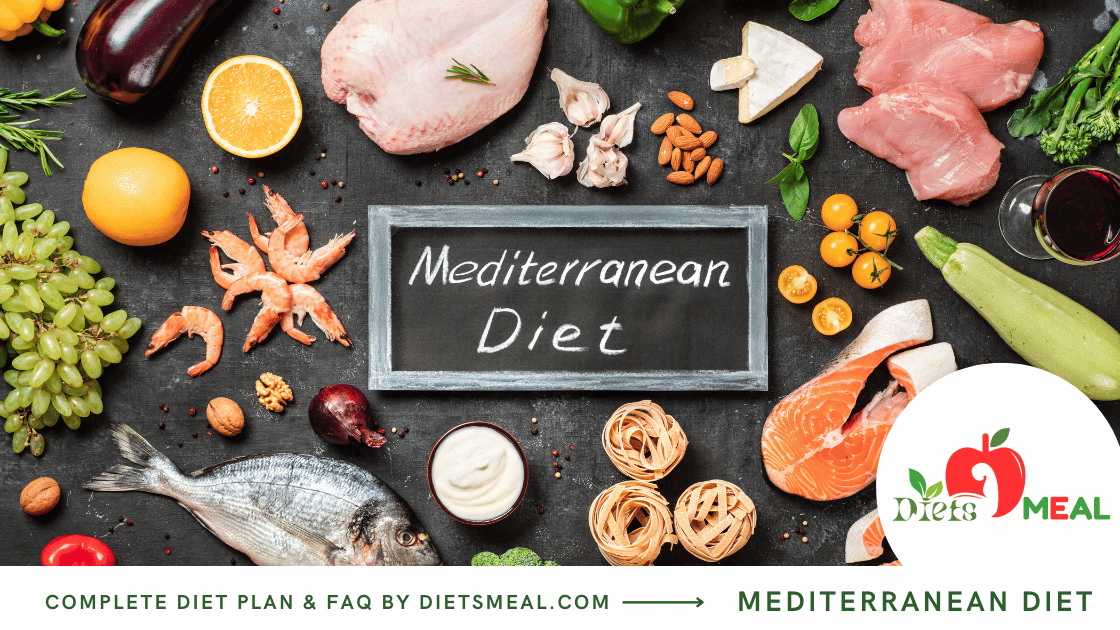The Mediterranean Diet (MD) has been linked with improved cardiovascular health and reduced depression and dementia risk. It focuses on general patterns of eating rather than restricting particular food groups.
Make some simple food changes such as switching out chicken for fish, swapping olive oil for butter, and switching from white flour bread to whole grain varieties of bread – and add more fruits, veggies and nuts!
What is the mediterranean diet?
The Mediterranean Diet is an increasingly popular eating plan that has been found to improve heart health and decrease diabetes risks, protect against cancer, lower weight gain and ease arthritis symptoms. Furthermore, this diet limits sugary beverages and beverages; salt; processed meats; fatty cheeses as well as emphasizes consumption of healthier whole foods such as nuts seeds olive oil. A primary care physician or registered dietitian can assist you in deciding if this plan is the best fit for you.
The Mediterranean diet combines fruits, vegetables, whole grains and heart-healthy fats for maximum nutritional benefit. Incorporating fresh herbs like basil, oregano and rosemary into meals adds flavor without increasing sugar consumption. Furthermore, plenty of water should be consumed and alcohol intake limited while you also incorporate fish, poultry, eggs and beans into meals while enjoying an occasional glass of wine with dinner. It is an ideal diet choice for managing blood glucose while simultaneously decreasing low density lipoprotein cholesterol (LDL) cholesterol and triglyceride levels. Finally, its benefits make this diet ideal for people living with diabetes as it can manage blood glucose while simultaneously decreasing LDL cholesterol and triglyceride levels.
What to eat on mediterranean diet?
 The Mediterranean diet is a well-rounded eating plan with low levels of both salt and saturated fat, featuring fruits, vegetables, legumes, nuts and whole grains as key staples. Seafood, lean proteins and healthy fats such as olive oil are encouraged; junk foods containing trans fats should be avoided altogether.
The Mediterranean diet is a well-rounded eating plan with low levels of both salt and saturated fat, featuring fruits, vegetables, legumes, nuts and whole grains as key staples. Seafood, lean proteins and healthy fats such as olive oil are encouraged; junk foods containing trans fats should be avoided altogether.
Be sure to include colorful fruits and vegetables at every meal, along with herbs and spices which provide essential phytonutrients. Avoid processed foods such as margarine; opt instead for whole-grain breads and pasta.
Everyday, aim for three to six servings of vegetables and two to four of fruit, as part of your Mediterranean diet plan. Lean proteins should also play a crucial role; experts suggest including cod, haddock, hake or whitefish among others as these fish contain lean proteins rich in omega-3 fatty acids which help lower triglycerides levels while protecting against heart disease. Beans such as lentils or kidney and black beans can add fiber boost.
What foods are not allowed on mediterranean diet?
The Mediterranean Diet emphasizes whole, healthy foods with an emphasis on vegetables and fruit, while discouraging processed food with added sugar, fats and salt as well as processed beverages with these elements. Furthermore, this diet recommends eating fish, poultry and lean proteins such as lean proteins with meals as well as enjoying moderate wine with meals in order to achieve weight loss, lower blood pressure and reduce cancer risks.
The diet encourages consumption of extra virgin olive oil, a source of heart-healthy monounsaturated fats and antioxidants known to scavenge free radicals and decrease inflammation. Other healthy oils such as canola and walnut oils are also encouraged. Incorporation of beans, lentils, nuts and fruits as part of this lifestyle plan.
The Mediterranean diet is a flexible eating plan, making it adaptable to fit the individual. A registered dietitian can assist you with customizing it to meet your health goals and personal preferences; additionally, they will make recommendations based on medical history, current conditions and allergies as well as ways to eliminate unhealthy foods from your diet.
What does the mediterranean diet consist of?
 The Mediterranean diet emphasizes whole, healthy foods including antioxidant-rich fruits and vegetables, lean protein such as fish or poultry from seawater or freshwater sources, nuts and whole grains – with some wine allowed occasionally as part of this plan – along with limited red meat consumption and limited processed food consumption. Furthermore, this plan stresses a balance of unsaturated fats such as olive oil with omega-3 fatty acids found in seafood seeds nuts or some vegetable oils for optimal nutrition.
The Mediterranean diet emphasizes whole, healthy foods including antioxidant-rich fruits and vegetables, lean protein such as fish or poultry from seawater or freshwater sources, nuts and whole grains – with some wine allowed occasionally as part of this plan – along with limited red meat consumption and limited processed food consumption. Furthermore, this plan stresses a balance of unsaturated fats such as olive oil with omega-3 fatty acids found in seafood seeds nuts or some vegetable oils for optimal nutrition.
Diets with this goal should feature seasonal produce as well as plant-based proteins like beans and lentils. Eggs, poultry and cheese should be consumed in moderation; red and highly-processed meats should be limited while chicken and pork tend to be preferred over beef for consumption.
The Mediterranean Diet (MedDiet) is known to help lower cholesterol and decrease belly fat. Furthermore, its phytochemicals may fight inflammation within your body while also encouraging physical activity and socializing with friends and family over meals. Studies suggest that following this dietary pattern could improve heart health while decreasing dementia risk; one recent study discovered those closely resembling it had less beta-amyloid deposits and a more efficient use of energy in their brains than those who didn’t resemble the MedDiet at all.
Is the mediterranean diet good for diabetics
 The Mediterranean diet is an innovative eating pattern designed to reduce your risk of Type 2 diabetes, promote weight loss, prevent oxidative stress and lower dementia/Alzheimer’s risk. Nutrit-rich foods in this eating plan help balance blood sugar and decrease inflammation levels for an overall healthier lifestyle.
The Mediterranean diet is an innovative eating pattern designed to reduce your risk of Type 2 diabetes, promote weight loss, prevent oxidative stress and lower dementia/Alzheimer’s risk. Nutrit-rich foods in this eating plan help balance blood sugar and decrease inflammation levels for an overall healthier lifestyle.
The PREDIMED study concluded that those following a Mediterranean diet had significantly reduced risks of major cardiovascular events, such as heart attack and stroke, when compared with those following low-fat diets. This finding supports decades of observational and interventional research demonstrating its advantages.
The Mediterranean diet includes an abundance of fruits, vegetables, and whole grains; “good” monounsaturated fats from nuts and olive oil; fatty fish with moderate red meat intake and limited sodium consumption. Social activities including sharing meals with family and friends as well as physical activity are encouraged for maximum health benefits from the Mediterranean diet. Make these changes part of your daily routine to reap its healthful advantages; follow Kristin Kirkpatrick on Twitter (@fuelwellwithkristin) to gain more information about how to eat this way!
How to start the mediterranean diet?
The Mediterranean Diet is a general eating plan that can help you lower your risk of heart disease. It also supports a healthy weight and may benefit people with prediabetes or Type 2 diabetes (check with your doctor before trying this diet for those conditions). A registered dietitian can help you modify the Mediterranean Diet to suit your medical history, underlying health concerns, allergies and preferences.
The diet emphasizes whole healthy foods, avoiding processed junk food and sugar. It includes plenty of vegetables and fruit, aiming for 7 to 10 servings a day (one serving is about 3 cups). It includes healthy fats like extra virgin olive oil, avocados and nuts. And it includes lean protein, including fish (salmon, mackerel and tuna) and poultry. The diet recommends limiting red meat to one serving per week, and replacing it with other sources of lean protein.
This eating plan limits added sugar and sodium, and promotes moderate amounts of alcohol with meals. Try shopping at local farmer’s markets for fresh, seasonal produce and artisanal foods. And try to eat together as a family as often as possible.
What are the main foods in a mediterranean diet
The main foods in a Mediterranean diet include fruits, vegetables, whole grains, nuts and legumes, fish (especially those rich in omega-3 fatty acids), and healthy plant-based oils like olive. It also allows moderate amounts of dairy and eggs and lean meats as well as up to a glass of wine with dinner.
Added salt is limited and herbs and spices, particularly those from the allium family (garlic, onions and leeks), are commonly used for flavor. It’s best to buy fresh ingredients, but frozen or canned are just fine as long as they don’t contain any added salt or sugar.
The Mediterranean diet is a popular eating plan and offers many health benefits, including lowering your risk of heart disease. It reduces your consumption of red meat and processed foods and encourages exercise, socialization and drinking red wine in moderation. This type of diet is similar to those found in two Blue Zones—Ikaria, Greece and Sardinia, Italy—where people live the longest. You should also avoid trans fats, high-fat dairy and refined sugars.
Can you lose weight on the mediterranean diet

The Mediterranean diet is one of the healthiest eating plans around, focusing on whole food rather than processed items and emphasizing vegetables, fruit, nuts, whole grains, lean proteins and healthy fats; with limited sodium and sugar intake. Wine may also be enjoyed occasionally as part of this plan!
Diets that promote heart health provide essential monounsaturated fats from olive oil and nuts, omega-3 fatty acids from seafood such as salmon and protective phytochemicals that will lower risk factors such as heart disease and diabetes. Fiber, vitamins, minerals and protective phytochemicals complete the picture to make up a heart-healthy diet plan that may lower risk.
This diet may not work for everyone and may not help you lose weight depending on your lifestyle and calorie needs. But following the Mediterranean diet may improve heart health and help promote weight loss by lowering risk for serious chronic diseases; plus it may even make you feel more energetic and happier while possibly increasing longevity! As with any weight-loss plan, portion sizes need to be strictly managed in order to be successful long term; in other words: it should become part of a permanent lifestyle decision!
The Mediterranean diet emphasizes plant foods, fatty fish and moderate consumption of meat and dairy. Furthermore, olive oil and other healthy fats such as nuts and avocados should be consumed as part of this lifestyle.
Avoid processed meats in favor of lean proteins such as roasted chicken and black bean burgers. Aim to consume seafood twice each week – when selecting fish species, look for ones with sustainable practices and low mercury levels; frozen or canned options offer extended shelf-life than fresh choices.
Does the mediterranean diet work?
The Mediterranean Diet is one of the best-researched eating plans. Known for its heart-healthy benefits and helping manage chronic conditions like diabetes, heart disease and high blood pressure; losing weight while simultaneously lowering cholesterol and triglyceride levels; as well as decreasing your risk for dementia Alzheimer’s or other neurological conditions is all part of its appeal.
The Mediterranean diet relies on eating whole, healthy foods – lean proteins, whole grains and plenty of fruits and vegetables are ideal. You should add healthy fats like olive oil and nuts for additional nutritional support and limit red meat, processed sugar, salt and alcohol as part of this lifestyle change. Consult your primary care doctor or dietitian before embarking on this diet to ensure it will meet your specific health requirements.
Recent research indicates that people who adhere closely to a Mediterranean diet may have lower risks of Alzheimer’s disease. Focusing on brain-healthy fats, fruits and vegetables as well as fish may protect against cognitive decline associated with Alzheimer’s as well as reduce inflammation while improving mood and memory.
Is mediterranean diet low carb?
The Mediterranean diet focuses on whole foods like vegetables, fruit and nuts as its primary sources of carbohydrates. Furthermore, processed products like cookies, crackers and prepackaged meals that contain high levels of sodium, sugar or additional ingredients like trans fats or artificial sweeteners should be restricted in consumption.
The traditional Mediterranean diet has been associated with lower rates of heart disease and reduced risk for other medical conditions, such as diabetes, obesity, Alzheimer’s dementia depression certain cancers metabolic syndrome frailty in older adults. It features plenty of olive oil as well as moderate quantities of fish legumes nuts and fruits in its meals.
Processed dessert foods should not be part of the Mediterranean diet; however, if you desire some treats on occasion, look for natural-sweetening sources like berries, yogurt and bananas which provide high amounts of fiber and natural sweetness. Be wary of consuming processed dairy products which often contain saturated fats, additives and added sugar.
Is mediterranean diet anti inflammatory
The Mediterranean Diet is an anti-inflammatory diet because it emphasizes whole food sources like vegetables, fruit, nuts and olive oil as its basis. Furthermore, it restricts processed sugar, salt and unhealthy fat intake along with dairy consumption while eating only moderate quantities of meat and dairy. Studies have demonstrated how such diet can decrease inflammation while supporting healthy aging as well as supporting better brain functions.
Studies conducted between 2023-2025 demonstrated that those following a Mediterranean-style diet were significantly less likely to exhibit Alzheimer’s and dementia symptoms, as this diet contains high amounts of fiber and probiotics which may help lower depression risk.
Integrate the Mediterranean diet into your life by making simple adjustments. For instance, opt for oatmeal with fruit and low-fat milk for breakfast instead of bagels or pancakes; switch red meat for chicken or fish at dinner time; serve salads as both lunch and dessert items; choose whole grains such as quinoa, brown rice or barley as entree options; add mushrooms – these contain compounds which act like natural antibiotics that may aid in improving gut health according to one recent study – into meals –
How fast do you lose weight on mediterranean diet?
The Mediterranean diet focuses on plant-based foods and healthy fats such as olive oil to achieve balanced nutrition with moderate portions of fish, beans, lentils, nuts and whole grains as its centerpiece. Red meat, sugary drinks and butter are prohibited while olive oil has been found to lower LDL (“bad”) cholesterol and triglycerides while including moderate quantities of cheese and yogurt are encouraged as part of this lifestyle diet.
Mediterranean diet food choices are packed with flavor and nutrition. In particular, avoid processed food which often contain high levels of sodium, sugar, trans fats, artificial additives or food dyes; aim to consume whole cheeses rather than processed ones which often include added emulsifiers or coloring.
The Mediterranean diet can seem complex at first, especially if you’re used to eating fast food and processed meals regularly. Working with a dietitian who can tailor it specifically for your medical history, underlying conditions, allergies and personal preferences can be invaluable. Make it part of your everyday life by including fruits, vegetables and whole grains into each meal along with water instead of sodas or juices as hydration sources.
Final Thoughts
The MedDiet is a heart-healthy eating plan that promotes longevity while protecting against chronic diseases such as cardiovascular disease, diabetes, high cholesterol levels, and depression. The plan emphasizes whole fresh foods paired with herbs and spices for flavoring dishes as well as limited red meat consumption as well as processed fats such as red meat. Plus it includes plenty of fruit, whole grains, healthy fats as well as balanced vegetarian versions if desired.
The Mediterranean Diet allows small amounts of wine with meals (one 5-ounce glass for women and two for men). It also encourages dairy products that are low in fat but high in calcium, phosphorus, vitamin A and D; it discourages processed cheeses and cured meats which contain excessive sodium, trans fats, emulsifiers or artificial colors.
The Mediterranean Diet (MedDiet) is simple and cost-effective way of eating. Try including more salads and vegetable sides when dining, using olive oil instead of butter for frying foods, and replacing meat with fish at least twice weekly. Furthermore, this diet provides relief for people living with diabetes by helping lower their blood sugar levels.

